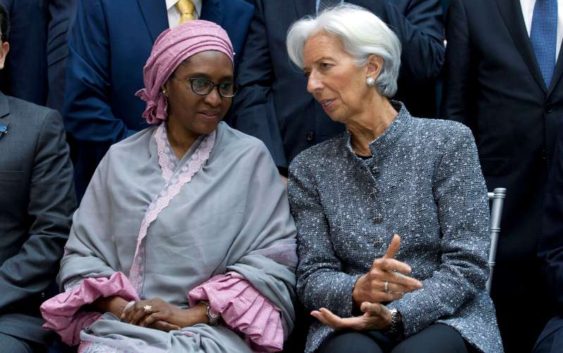- Governor Sanwo-Olu flags off Ojota-Opebi Link Bridge, to be completed in 20 months
- Allow Nigeria go to 2022 World Cup, don’t play qualifiers – Ghana Parliament member tells Black Stars
- There was no second sex tape, Kim Kardashian refutes Kanye West’s claims
- Jaruma Remanded In Prison Over Post On Regina Daniels And Ned Nwoko
- Lanre Gentry confirms paternity of last son with Mercy Aigbe, says ‘He’s my son’ (Photo)
Nigeria’s borrowing low compared to Ghana, Brazil, others – Finance minister

The Minister of Finance, Mrs. Zainab Shamshuna Ahmed, has disclosed that Nigeria’s borrowing still stands at 19 per cent of the Gross Domestic Product (GDP), and low compared to what Ghana, Brazil, South Africa, Egypt and Angola have borrowed.
The Minister made the statement while clarifying on the true position of affairs surrounding the alleged plan to remove fuel subsidy, which she maintained was not on the front burner at the moment.
Mrs. Ahmed stressed that the International Monetary Fund (IMF), merely advised the Federal Government to remove fuel subsidy at the just concluded Spring Meetings in Washington DC, United States of America, USA. In a statement issued in Abuja, Tuesday by the Special Adviser to the Minister of Finance on Media and Communications, Mr Paul Ella Abechi, said the difference on the issue of subsidy compared to previous regimes where subsidy was paid to marketers, is that this time round “NNPC is the sole importer of petroleum products, and so when it imports, its cost of transaction is deducted before remitting the little money to the federation account. So that is completely different.”
She also added that “It is more cost effective; it is cheaper and what is being done now is easier to monitor what transpired.”
The finance minister said, “In the borrowing, we are still at 19 per cent to GDP our borrowing is still low. What is allowed by our Fiscal Responsibility Act is the maximum of 25 per cent of our GDP compared to other countries like: Ghana, Egypt, South Africa, Angola and Brazil and we are the lowest in terms of borrowing.
However, she acknowledged the challenge of revenue generation by the country. “What we have is revenue problem and when revenues perform the aggregate rate of 55 per cent, it hinders the ability to operate in our budget.
“So it hinders our ability to service all categories of expenditures including salaries, allowances, capitals as well as debts.” The minister reassured that the Ministry was not resting on its oars in its effort atboosting the nation’s revenue.“So what we are doing at the Ministry of Finance is concentrating and enhancing our revenue and collection capacities”, she stated.
She argued that there is no intention by the government to remove subsidy as widely reported in some sections of the media, as government was yet to come up with any plan in that direction.
We are not there yet and we discussed this periodically under the Economic Management Team, but we have not found a formula that works for Nigeria and you know Nigeria is unique because what works in Ghana may not work here.